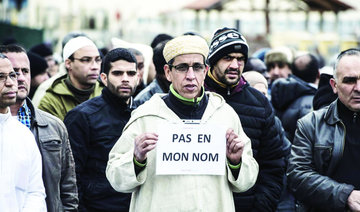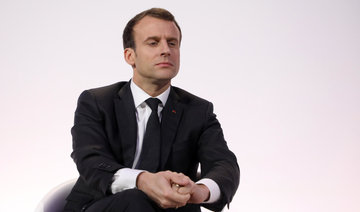PARIS: A major French railway strike brought the country’s famed high-speed trains to a halt Tuesday, leaving passengers stranded or scrambling for other options — and posing the biggest test so far of President Emmanuel Macron’s economic strategy.
The SNCF national rail authority said only about 12 percent of trains were running during the first of a series of weekly two-day strikes that labor unions have called for the next three months.
Rail service is expected to remain “very disturbed” Wednesday, with 86 percent of trains canceled nationwide, according to forecasts from state-owned SNCF.
International traffic also will be reduced for a second day from Paris to London and between France and Germany, SNCF predicted. No trains are expected to be operating between France and Italy, Spain and Switzerland, the railway company said.
The strike’s impact immediately was visible on Tuesday .Passengers hitched rides on traffic-clogged roads and shared travel tips online.
At the Gare de Lyon station in eastern Paris, platforms were so packed that commuters spilled over onto the tracks as they waited for infrequent trains. Two people were injured, including a woman in the head, according to SNCF manager Alain Krakovitch.
Commuters expressed anger at the overall situation, but were not necessarily taking sides.
“Really this is catastrophic. Something needs to be done. We are the victims. We haven’t done anything. We need to get to work like everyone else,” Aziza Fleris, 56, said.
“I was really positive this morning, but now — you should have seen what happened on the train. Some people felt unwell, women were crying. Children. This isn’t normal,” Fleris said.
SNCF said 77 percent of train drivers were on strike. The overall proportion of rail workers participating in the work stoppage including employees on trains and on the ground— was 33.9 percent, the company detailed in a statement.
Labor unions say Macron — a centrist former investment banker whom critics consider the president of the rich — is threatening hard-fought French rights that workers in other countries envy, as well as damaging the whole idea of public service.
A few thousand demonstrators marched through the French capital at the call of rail workers union.
“We are very satisfied with the number of strikers because due to the strike practically the entire railway network was paralyzed,” Francois Grasa, leader of the FO Cheminots (Railway Workers) Union, said.
“It doesn’t make us happy to go on strike. We lose money when we are on strike,” Grasa added.
A group of about 100 people, most of them young, overtook the striking train workers and their supporters at the Paris march, smashing shop and bank windows.
The police charged the crowd and ordered the demonstration dispersed. No injuries were reported. Five people were detained.
All in all, it was one of the worst days of industrial strife in France since Macron was elected president nearly a year ago. Macron has made reforming France’s economy a central plank of his presidency. Many of his plans, particularly in the labor market, are meeting with increasing opposition from France’s unions.
There was further disruption in the air, with Air France canceling a quarter of its flights Tuesday amid a strike over pay.
Students also blocked campuses to protest plans to allow selection in state universities, while garbage collectors are on strike to protest what they say are worsening working conditions.
Rail workers are protesting plans to eliminate a special status that they’ve enjoyed for decades.
The “cheminot” status effectively guarantees jobs for life and other benefits, in keeping with the image of France’s railways as an essential pillar of the country’s infrastructure and its public services.
The government wants to maintain the status for existing workers, but abolish it for new workers.
Macron’s government says the guarantee is no longer tenable in a globalized and increasingly automated economy that requires more flexible workforces.
In addition, with European Union rules requiring all member states to open up government-run railways to competition, the government argues that the special status puts SNCF at a disadvantage compared to potential private competitors.
























